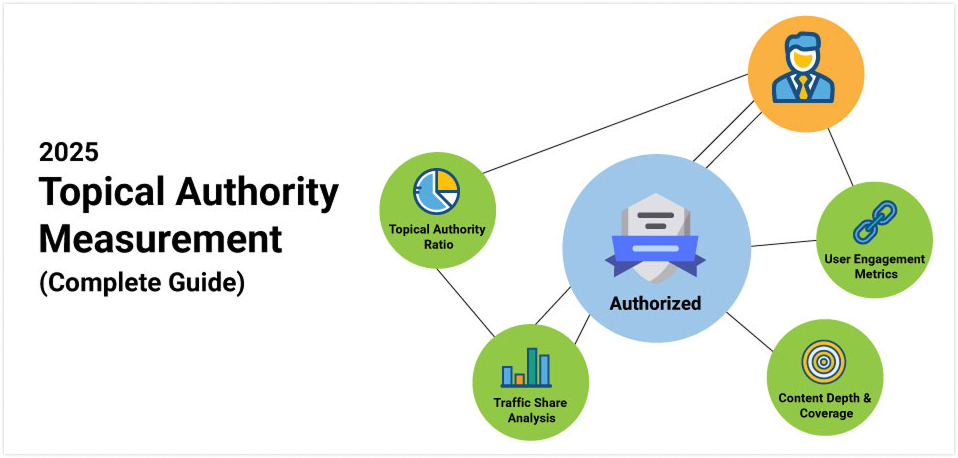In the constantly evolving world of SEO, topical authority is now a key factor
influencing search engine rankings. Because search engines like Google are always changing their algorithms to
favor content that demonstrates knowledge and thorough coverage of particular subjects, digital marketers,
content producers, and SEO specialists now need to understand and measure topical authority. The concept of
topical authority, its significance in 2025, and the tools and resources available for measuring it are all
covered in this guide.
What Is Topical Authority?
The perceived competence and reliability of a website or content publisher in a
specific field is known as topical authority.
Topical authority is the perceived expertise and dependability of a website or content publisher in a particular
field.
Offering comprehensive, high-quality, and relevant content that covers a wide range
of topics is just as important as having a large number of pages on a subject. Search engines assess topical
authority to determine which websites are most appropriate to rank for queries related to a particular
topic.
Why Topical Authority Matters in 2025

The focus on topical authority has increased in 2025 for a number of reasons:
- Improved User Experience:
People look for thorough and reliable information. Topical authority websites are more likely to live up
to user expectations, which boosts user satisfaction and engagement.
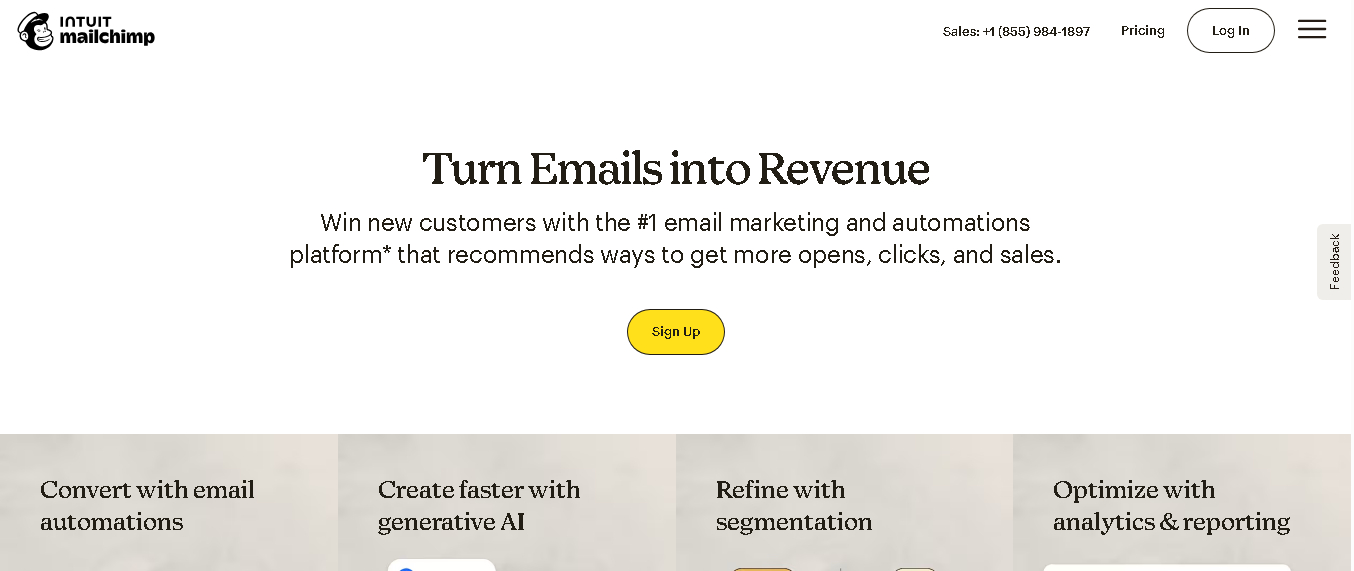
- Algorithmic Developments: Search engines are now better able to assess the depth and applicability of
content. They prefer websites that demonstrate in-depth coverage of subjects, indicating knowledge and
dependability. - Competitive advantage: In
crowded niches, topical authority can set a website apart, resulting in higher rankings and more organic
traffic.
Methods to Measure Topical Authority
Measuring topical authority involves assessing various qualitative and quantitative
factors. Below are the primary methods utilized in 2025:
1. Topical Authority Ratio
One metric that assesses the percentage of a website’s content devoted to a
particular topic is the topical authority ratio. It is computed by dividing the total number of indexed pages on
the website by the number of pages pertaining to a specific topic.
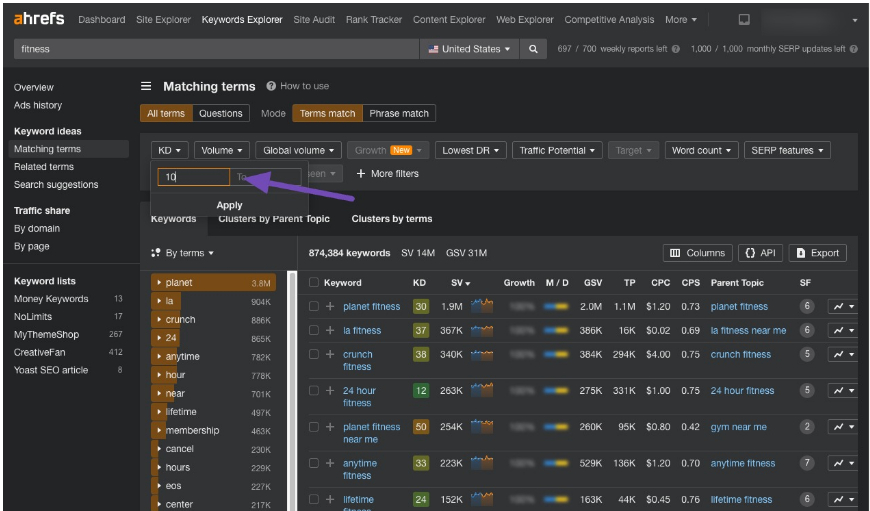
Formula:
Topical Authority Ratio = (Number of Topic-Specific Pages) / (Total Indexed
Pages)
Example:
If a website has 500 pages, and 200 of them are about “digital marketing,” the
topical authority ratio for digital marketing is
200 / 500 = 0.4
A higher ratio indicates a stronger focus and authority on the topic.
2. Traffic Share Analysis
Analyzing traffic share entails comparing a website’s share of search traffic for a
given topic to that of its rivals. For specific keywords or topics, tools such as Ahrefs and Semrush offer
insights into the distribution of traffic across domains.
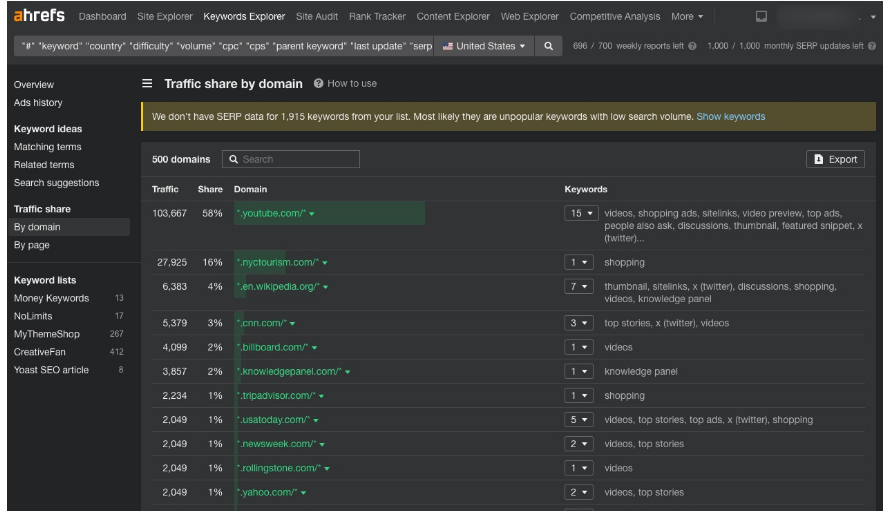
Steps:
- Identify a core topic or keyword cluster.
- Use SEO tools to examine the traffic shares of these keywords on your website and those of your rivals.
- A higher traffic share indicates stronger topical authority.
3. Keyword Rankings and Visibility
Assessing topical authority involves keeping an eye on keyword rankings for phrases
related to the issue. Consistent high rankings for a range of related
keywords suggest strong authority.
Tools:
- Semrush Position Tracking
- Ahrefs Rank Tracker
Metrics to Monitor:
- Number of keywords ranked in the top 10 positions.
- Improvements in rankings over time.
4. Content Depth and Coverage
It’s critical to assess how thorough a topic’s content is. MarketMuse and Clearscope
are two tools that evaluate content to assess how well a subject is covered.
Evaluation Standards:
- Inclusion of subtopics and related questions.
- Depth of information provided.
- Use of authoritative sources and data.
5. Backlink Profile Analysis
Topical authority is increased by a robust backlink profile from reliable and
pertinent sources. Assessing authority is aided by examining the caliber and applicability of backlinks.
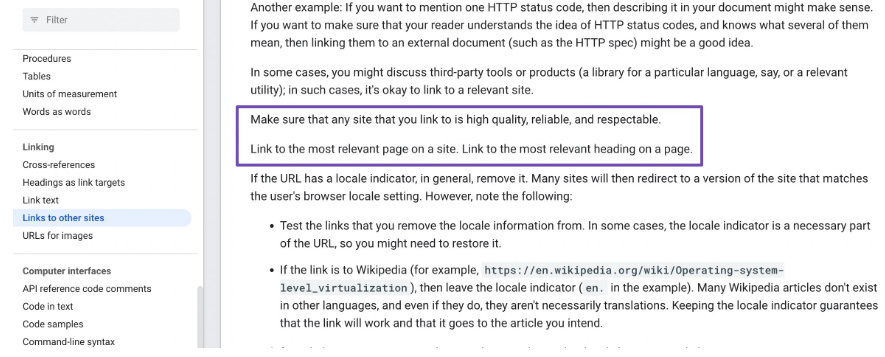
Tools:
- Ahrefs Site Explorer
- Moz Link Explorer
Key Metrics:
- Number of backlinks from authoritative domains.
- Relevance of linking domains to your topic.
6. User Engagement Metrics
High user engagement indicates valuable and authoritative content. Metrics to
monitor include:
- Average time on page.
- Bounce rate.
- Pages per session.
Tools like Google Analytics provide these insights, helping assess how users
interact with your content.
Tools for Measuring Topical Authority
Several tools assist in evaluating and enhancing topical authority:
1. Ahrefs
Ahrefs offers comprehensive SEO analysis, including:
- Keyword rankings.
- Backlink profiles.
- Content gap analysis.
Its “Traffic Share by Domains” feature helps assess topical authority by showing how
much traffic a domain receives for specific topics.
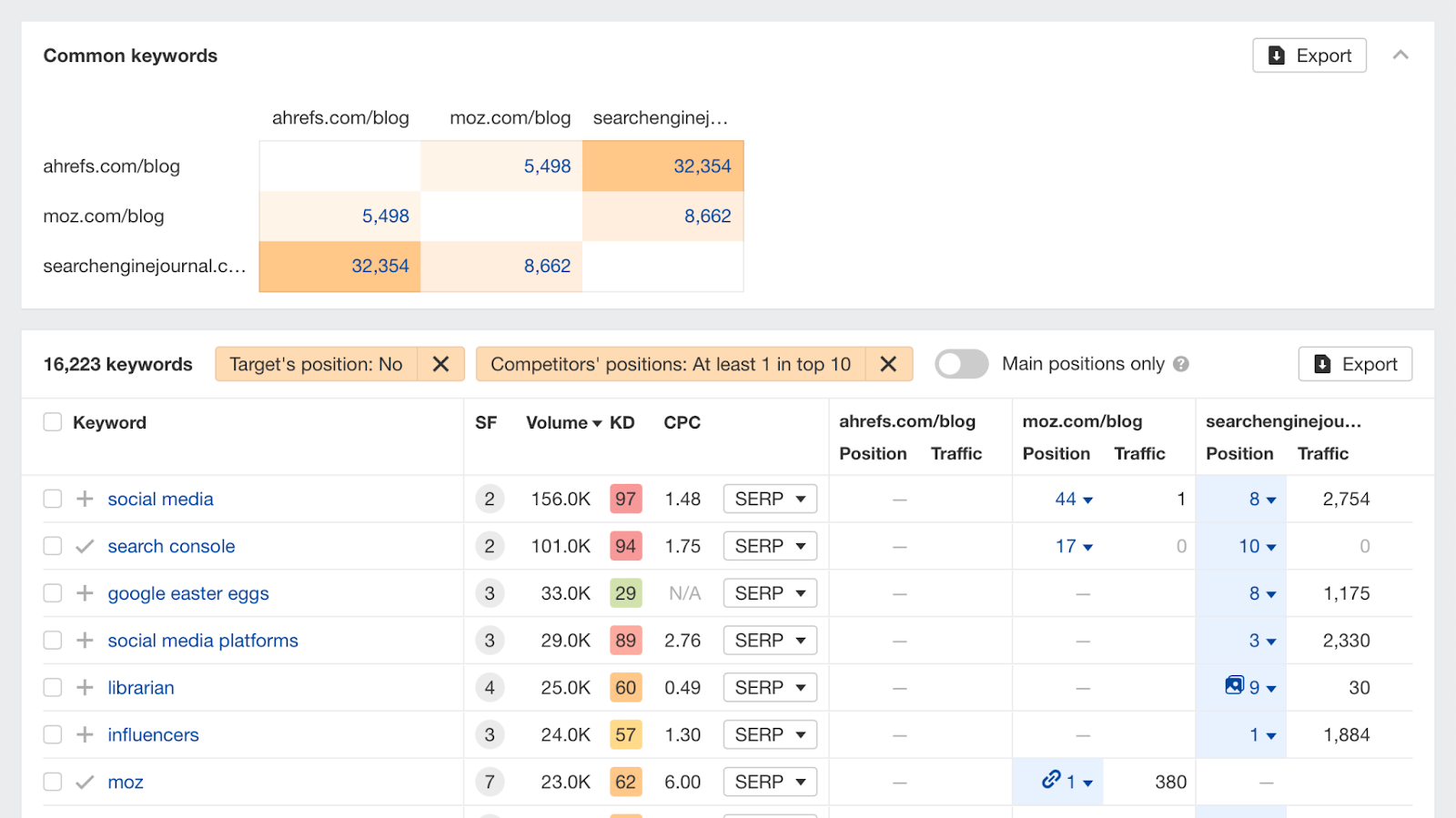
2. Semrush
Semrush provides tools for:
- Keyword research and tracking.
- Backlink analysis.
- Content optimization.
The Keyword Overview tool’s “Topical Authority” indicator shows how authoritative a
website is for particular keywords.
3. Clearscope and MarketMuse
These content optimization platforms analyze content for comprehensiveness and
relevance, offering suggestions to improve topical coverage and authority.
4. Google Analytics
Google Analytics tracks user behavior, providing insights into engagement metrics
that reflect content authority and value.
Strategies to Enhance Topical Authority
Building topical authority requires a strategic approach:
1. Develop Topic Clusters
Organize content into clusters around central themes, linking related articles to a
pillar page. This structure signals to search engines the depth and breadth of your content on a topic.
2. Produce Detailed Content
Write comprehensive articles that cover many facets of a subject in detail,
answering frequently asked questions and offering insightful commentary.
3. Consider User Intent When Optimizing
Make sure your content provides pertinent and useful information in line with your
target audience’s search intent.
4. Get High-Quality Backlinks
To increase authority and credibility, concentrate on obtaining backlinks from
reputable and pertinent websites.
5. Regularly Update Content
Maintain relevance and authority by keeping content up to date by adding fresh
perspectives, updating information, and eliminating out-of-date data.
Conclusion
Analyzing user engagement, backlink profiles, keyword rankings, and content depth
are all part of the complex process of determining and establishing topical authority. In 2025 and beyond, you
can raise your website’s search engine rankings and boost organic traffic by using the appropriate tools and
tactics to position it as a reliable authority in your niche.
FAQs (Frequently Asked Questions):
-
What is topical authority?
The level of knowledge, credibility, and depth of content a
website exhibits regarding a particular topic is known as topical authority. Based on
user engagement, backlink quality, internal linking, and relevance, it tells search
engines that your website is a go-to source for specific subjects. -
Why will topical authority matter in 2025 for SEO?
Topic-based content structures will be given precedence over keyword-stuffed
pages by Google and other search engines in 2025. By indicating that your website thoroughly covers a
topic, topical authority helps raise trust signals, improve rankings, and guarantee long-term organic
growth.
-
How can I measure topical authority on my website?
You can measure topical authority through:
- Keyword coverage and clustering
- Internal linking structure
- Engagement metrics (time on page, bounce rate)
- Backlink profile from topic-relevant domains
- Tools like Ahrefs, Semrush, and MarketMuse
-
What tools help track topical authority in 2025?
Popular tools include
- Ahrefs (Content Gap, Traffic Share)
- Semrush (Authority Score, Keyword Clusters)
- MarketMuse/Clearscope(Topic coverage and content scoring)
- Google Search Console(Indexing and performance)
- Google Analytics 4(Engagement metrics)
5. What distinguishes topical authority from domain authority?
- Domain authoritymeasures overall site strength and link profile.
- Topical authorityfocuses on how authoritative your site is within a specific subject area. You can have high topical authority in a niche even with moderate domain authority.
-
How long does it take to build topical authority?
It usually takes 3 to 6 months
of consistent publishing, content optimization, and proper internal linking to start seeing improvements
in topical authority. Results, however, can differ depending on the level of competition and the caliber
of the content.
